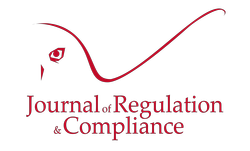The recent news
Feb. 11, 2020
Breaking news

Dec. 1, 2019
Breaking news

Nov. 28, 2019
Events : JoRC

The conferences cycle Les outils de la Compliance (The Compliance tools) taking place between November 2019 and June 2020 organized by The Journal of Regulation & Compliance and all the Partner Universities will start this year on the theme of "La cartographie des risques" (Risk Mapping) .
_________
Conference - Debate (in French)
jeudi Thursday, November 28, 2019. 19h15 – 21h15
at the Economics Department of Sciences Po
28 rue des Saints-Pères 75007 Paris
Amphithéâtre Simone Veil
Under the scientific coordination of Guillaume Sarrat de Tramezaigues, Executive Director fo the Economics Department of Sciences po.
Risk Mapping is defined as a process of identifying, evaluating and prioritizing risks: it is an integral and fundamental part of an effective global strategy for managing these risks.
As a central tool for Compliance, this approach may not be radically new, but the Risk Mapping Technique is now renewed and sometimes compromised by the emergence of new Risks, often due to their new mutiform nature. Moreover, the primacy of the new pair of "Political Risks/Compliance Risks" tends to increase the vulnerability of organizations obliged by new legal provisions to draw up these maps, whereas these tools must also protect these organizations.
Before discussing it with the audience, the speakers will explain through their experience the place of this tool in Compliance, by looking at how Risk Mapping is articulated with the logic of value creation through risk-taking, inherent in entrepreneurial and political action. This good understanding is not only essential for the company, but also for the administrative and judicial authorities which control or sanction firms.
Especially with the interventions of:
- Marie-Anne Frison-Roche, full professor of Regulatory Law and Compliance Law, Sciences Po
- Jean-François Guillemin, former general secretary of the Bouygues Group
- Lamia Liabes, Chief Operating Office, HSBC France
- Guillaume Sarrat de Tramezaigues, executive Director fo the Economics Department of Sciences po
Inscription : anouk.leguillou@mafr.fr
_________
This first event is more specifically organized by the Economics Department of Sciences po.
It opens the cycle of conferences organized by the Journal of Regulation & Compliance (JoRC) (see the partners of this cycle), whose general theme is Les outils de la Compliance (The Compliance tools).
Read the General Presentation of the Conferences Cycles.
This manifestation will be the basis for a book.
Read the conditions for inscription, and conditions for access les conditions d'accès (in French).
_________
Sept. 18, 2019
Breaking news

Sept. 15, 2019
Breaking news

Aug. 30, 2019
Breaking news

As the previous cycles devoted to the general theme of Compliance and aiming to build a "Compliance Law", this cycle takes a particular aspect of this branch of the Law being built and developed, which was applied even before being conceived. Since pragmatism preceded or even prevailed, the theme chosen this year is: Les outils de la Compliance (Compliance Tools).
These conferences will be in French
These tools are very diverse, not only among themselves but according to the sectors in which they are deployed or according to the geographical areas in which they are applied. It is necessary to apprehend them by going beyond the description of the instrument literally shown, as the texts or the promoters show it, without immediately going up to too large generalities. For this reason, some conferences will focus on specific, well-identified mechanisms, such as risk mapping or alert. They may also consider how Compliance Law uses more general tools to achieve its goals, such as lawsuits, incentives or new technologies. This will make it possible to problematize more clearly perceptible difficulties in Compliance Law, such as the adequacy or inadequacy of the constraint in relation to the aims, the consideration or not of the legal and political geography, the articulation or not of the tools between them.
These various conferences will take place in several places, according to the part taken by the different university structures that this year contribute to the Journal of Regulation & Compliance (JoRC) for the realization of the cycle. The result will be two books, one in French: Les outils de la Compliance, the other in English: Compliance Tools.
This cycle of conferences about Compliance tools will begin in November 2019 and will last until June 2020.
- First conference: 28 November 2019, La cartographie des risques (Risk Mapping), Sciences po. This conference will be in French. Its publication will be in French and in English.
- Conditions of inscription (in French).
Le Journal of Regulation & Compliance (JoRC) works with :
- The School of Public Affairs of Sciences Po,
- The Department of Economics of Sciences po,
- The École de Droit of the Panthéon-Sorbonne University (Paris I),
- The École doctorale de Droit privé of Panthéon-Assas University (Paris 2),
- The Centre Perelman of l'Université Libre de Bruxelles,
- The GREDEG of the Sophia-Antipolis University (Nice),
- The Centre Louis Josserand of the Faculté Lyon III.
- The Faculté de Droit of Toulouse,
- TheFaculté de Droit of Clermont-Ferrand.
This cycle of conferences is supported by :

